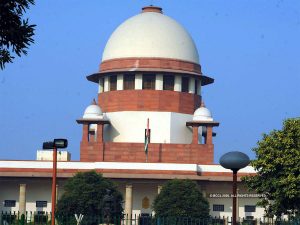Maratha Reservation Struck Down: SC:

A five-judge Constitution Bench of the Supreme Court has struck down the Maharashtra law granting reservation to the Maratha community in admissions and government jobs in the state.
- In November 2018, the Maratha community was given the reservation under the Maharashtra State Socially and Educational Backward Act.
- The special act was sanctioned by Maharashtra State Backward Class Commission and approved in both the assembly and council.
- The Maratha reservation of 12 and 13 percent (in education and jobs) had increased the overall reservation ceiling to 64 percent and 65 percent, respectively.
Judicial Intervention:
- Initially, the reservation under SEBC was challenged by a PIL in Bombay High Court. The Bombay High Court while upholding the reservation pointed that instead of 16 percent it should be reduced to 12 percent in education and 13 percent in jobs.
- Accordingly, the Act was implemented with Maratha students availing the quota in educational institutions and jobs.
- On September 9, 2020, the Maratha reservation confronted another hurdle as Supreme Court stayed its implementation and refer the case to the Chief Justice of India for the larger bench.
1992 Indira Sawhney Judgment:
- In the 1992 landmark ruling in Indra Sawhney v Union of India, in which the Mandal Commission report was upheld, the Court laid down two important precedents.
- First, it said that the criteria for a group to qualify for reservation is “social and educational backwardness”.
- Second, it reiterated the 50% limit to vertical quotas reasoning that it was needed to ensure “efficiency” in administration. However, the court said that this 50% limit will apply unless in “exceptional circumstances.”
The issues:
- The Maratha quota exceeded the 50% ceiling.
- The Court held that a separate reservation for the Maratha community violated Articles 14 (right to equality) and 21 (due process of law).
Maharashtra Government’s arguments:
- The Indra Sawhney verdict must be referred to an 11-judge Bench for reconsideration since it laid down an arbitrary ceiling that the Constitution does not envisage.
- Additionally, in some judgments subsequent to Indra Sawhney, the Supreme Court itself had made exceptions to this rule.
The court held that there is no need to revisit the case. The court said that the 50% ceiling, although an arbitrary determination by the court in 1992, is now constitutionally recognized.
- The Marathas are the dominant forward class and are in the mainstream of National life. Hence, the court observed that the above situation is not extraordinary.
The Constitution 102nd Amendment Act, 2018 gives constitutional status to the National Backward Classes Commission.
- The Amendment also gives the President powers to notify backward classes.
- Several states raised questions on the interpretation of the Amendment and argued that it curtails their powers.
- However, the Bench unanimously upheld the constitutional validity of the 102nd Amendment.
- The majority opinion also said that while the identification of SEBCs will be done centrally, state governments retain the power to determine the extent of reservation and make specific policy in the spirit of “cooperative federalism




